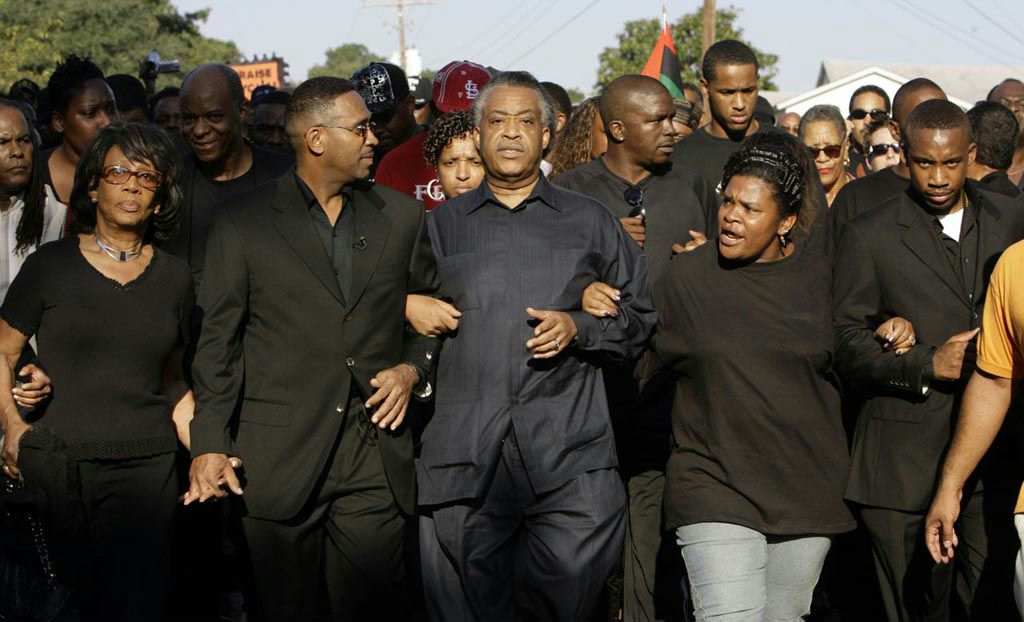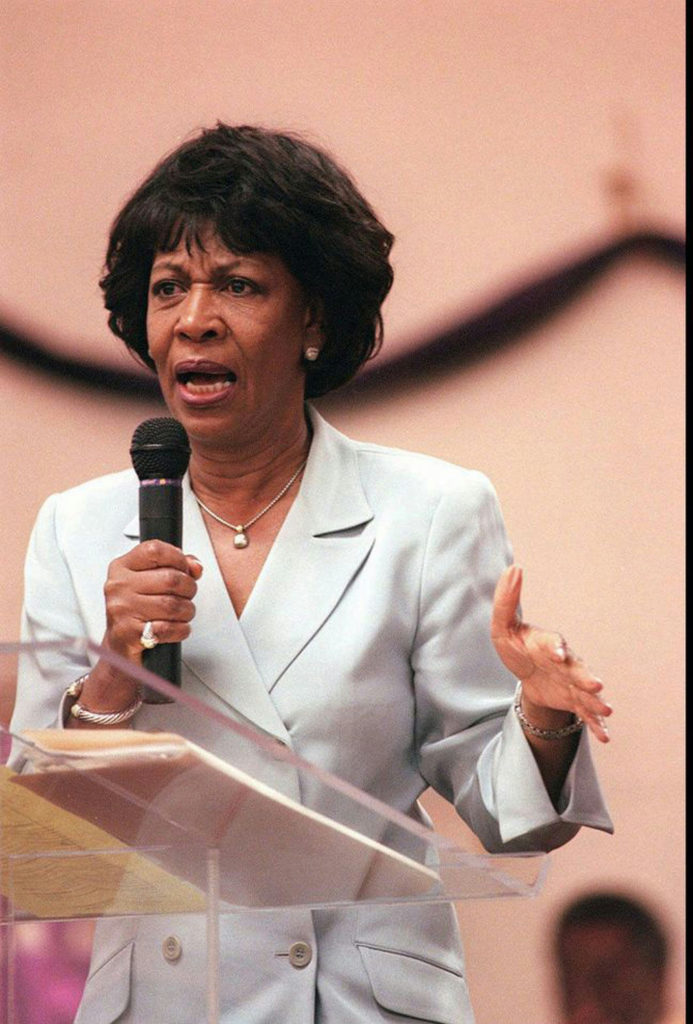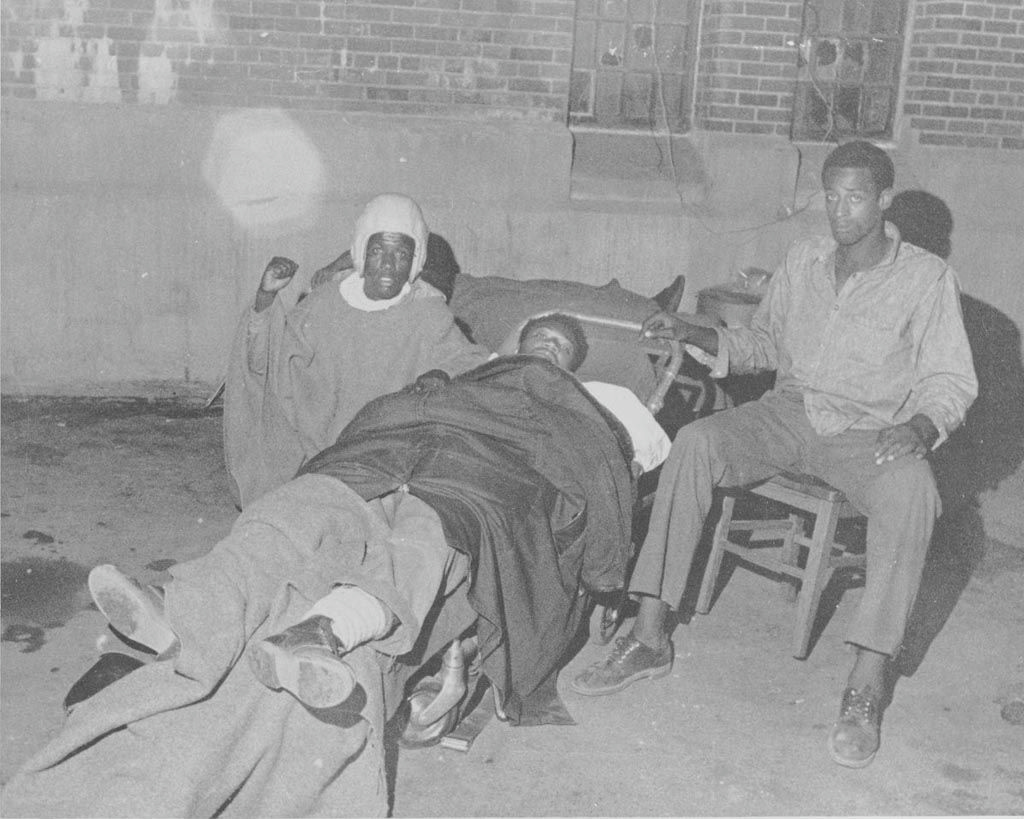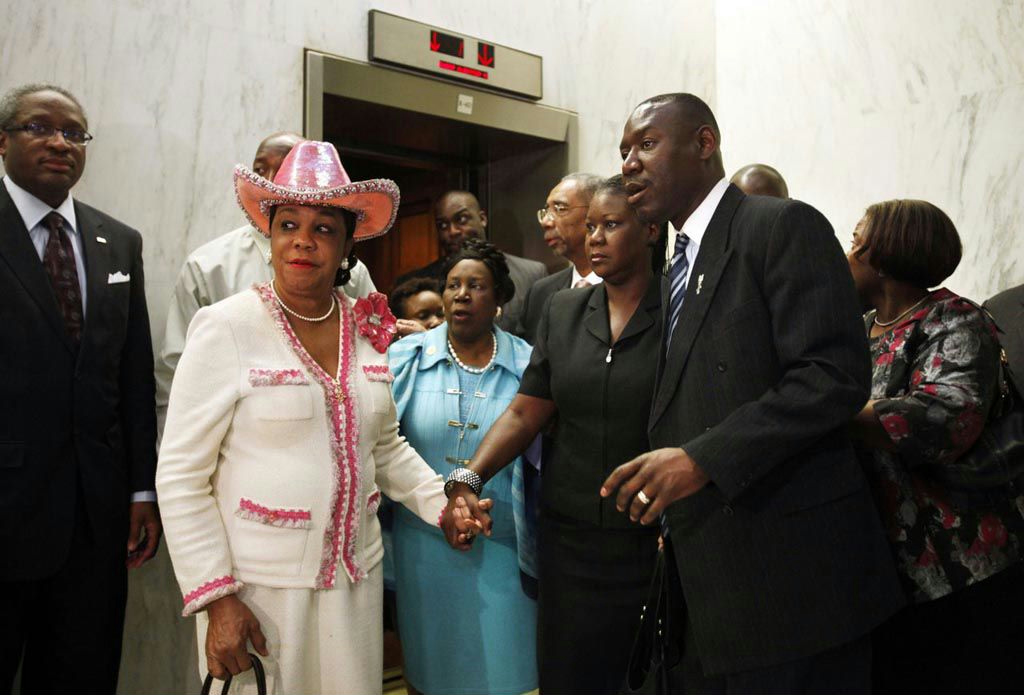Criminal Justice: Public Advocacy
Discover the history of CBC activism on criminal justice issues including police brutality, drug trafficking, sentencing and prison reform.

Marching to Support the Jena Six (2007)
From left, Rep. Maxine Waters (CA), walks with radio personality Michael Baisden, Rev. Al Sharpton, and Melissa Bell during a march in support of the Jena Six in Jena, LA, Thursday, September 20, 2007.
The role of public advocate is one the Congressional Black Caucus (CBC) has openly embraced, whether on the grassroots level, or on the House floor. On the issues of prison reform, capital punishment, juvenile justice, drug reform, and police brutality, the CBC has remained especially vigilant, publicly speaking out against the ills and shortcomings of the criminal justice system.
In the early 1970s, at the height of numerous reports of prisoner mistreatment, CBC members Reps. Ronald Dellums (D-CA) and Charles Rangel (D-NY) emerged as the leaders in the effort to secure better treatment for prisoners across the country. Rep. Rangel accomplished this through his service and leadership on the Judiciary Committee from 1971 to 1974, and his work on the Select Committee on Crime from 1971 to 1973. Rep. Dellums acted on the grassroots level, not merely introducing and co-sponsoring legislation on prisoner reform, but through his work to give a voice to prisoners in the media. Between 1971 and 1975, Dellums authored a series of letters and articles; gave TV program addresses; and made public appearances to inform the public on the mistreatment of prisoners. Up to the early 1980s, Rep. Dellums remained a vocal advocate through legislation, as he introduced and co-sponsored several bills, including the Omnibus Penal Reform Act.
On the issue of capital punishment, the CBC has assumed the role of public advocate to challenge the disproportionate incidents of Black inmates receiving death sentences. In the 1986 case of Warren McCleskey in Georgia, for example, the CBC moved outside the policy arena to challenge the justness of McCleskey’s death sentence. To the CBC, McCleskey, a Black man and death row inmate, represented other Black men in prisons across the country who were being sentenced to death at higher rates than their white counterparts. The CBC wrote an amicus brief in partnership with civil rights organizations, supporting the argument that “unequal application of criminal statutes on the basis of race [was] a violation of the Constitution,” and that proving racial disparity in death sentencing was enough to consider reversing death penalty judgment. A similar situation emerged in 1988 in Rep. Mickey Leland’s (D-TX) district. Clarence Lee Brandley, a Black man, was sentenced to death by lethal injection. Many of Brandley’s supporters determined the charges against him to be a “racist frame-up,” including Rep. Leland who spoke out against the judgment. Rep. Leland appeared in newspapers across his district, pledging to introduce a bill that would delay Mr. Brandley’s execution until he could be fairly tried. The case of Troy Davis in 2011 garnered a similar response by members of the CBC. Rep. John Lewis (D-GA) spearheaded the effort to write letters, spoke publicly, and pleaded on Davis’s behalf for sentencing reconsideration citing substantial holes in his case. More recently, in 2020, CBC Chair Rep. Karen Bass (D-CA) and CBC Secretary Rep. Hank Johnson (D-GA) sent a letter to Attorney General William Barr urging him to put an immediate stay on federal executions, arguing that the COVID-19 pandemic made it difficult for inmates sentenced to death to access the legal services needed to appeal.
The CBC’s response to public outcry was not limited to matters of prison reform and capital punishment. On countless occasions, members of the CBC have heeded public calls to address drug reform and juvenile justice. The story of Kemba Smith garnered national attention in the 1990s, but for members of CBC, it was especially important because it justified the need for post-Reagan drug reform. Kemba Smith, a Black student at Hampton University, was sentenced to 25 years in prison for her association with her boyfriend at the time, who was a drug dealer and leader of a crack cocaine ring. Smith’s case brought to light the shortcomings of mandatory minimum sentencing outlined in President Reagan’s Anti-Drug Abuse Acts of 1986 and 1988 and the laws’ potentially damaging effects on segments of American society. Tireless efforts on behalf of Smith’s family, the NAACP Legal Defense Fund, the Congressional Black Caucus, and several other organizations led to Smith being pardoned by President Bill Clinton in 2000. During the years fighting for her release, Rep. Maxine Waters (D-CA) became one of Smith’s strongest advocates, both within the CBC and outside of it. Other CBC members joined her in the fight, including Reps. Robert C. “Bobby” Scott (D-VA) and Rep. Conyers, who in 1997 joined Rep. Waters in denouncing mandatory minimum sentencing policies at a Free Kemba Smith rally in Washington, D.C.
In 2006, the case of six young Black men, also known as the “Jena Six” in Jena, Louisiana, not only caught the attention of the CBC, but galvanized the public on the issue of juvenile justice. Following a series of what many people considered racially charged incidents at Jena High School, six Black teenagers, ranging between the ages of 14 and 18, assaulted Justin Barker, a white student at the same high school, and were convicted and charged with offenses that many argued were too severe and racially discriminatory. The Jena Six were initially charged with attempted second-degree murder and one of the teenagers, Mychal Bell, who was 16 at the time of conviction, was charged as an adult for aggravated battery and conspiracy to commit aggravated battery. These charges were ultimately reduced, but the initial charges and the public outcry were enough to prompt CBC members to action. Reps. Sheila Jackson-Lee (D-TX), John Conyers (D-MI), and Carolyn Kilpatrick (D-MI) were especially vocal on the issue. In 2007, Rep. Conyers held hearings and organized a forum on the Jena Six at the Congressional Black Caucus Foundation’s Annual Legislative Conference in which both Rep. Jackson-Lee and Rep. Elijah Cummings (D-MD) participated. Later that year, Rep. Jackson-Lee wrote a letter to then-Louisiana Governor Kathleen Blanco, which called on the governor to pardon Mychal Bell and the five other teenagers of the Jena Six. Reps. Jackson-Lee, Conyers, and Kilpatrick held a press conference with Revs. Jesse Jackson and Al Sharpton in 2008 after the verdict had been reached for the teenagers.
In recent years, CBC members have pressured presidential administrations and federal agencies to address criminal justice reform and police accountability. CBC members included criminal justice reform among the agenda topics for Caucus meetings with Presidents Barack Obama, Donald J. Trump, and Joseph R. Biden at the beginning of each president’s terms. They also pushed back against administration decisions or inaction they felt would negatively impact Back Americans’ equal treatment in the justice system. For example, in 2017, CBC Chair Rep. Cedrick Richmond (D-LA) joined CBC members Rep. John Lewis (D-GA) and Sen. Cory Booker (D-NJ) in making statements opposing the nomination of Sen. Jeff Sessions (R-AL) to serve as Attorney General under the first Trump Administration. They asserted that Sen. Sessons’ record of public service indicated that he would not stand up for people of color or others facing discrimination in the justice system. In 2020, members of the CBC led by Del. Stacey Plaskett (D-VI) met with Federal Bureau of Investigation Director Christopher Wray to discuss the agency’s response to law enforcement misconduct and to the demonstrations spurred in response. The CBC also spoke out after President Donald Trump announced the executive order, Safe Policing for Safe Communities, later that year, asserting that the order fell short of addressing demands for accountability and transparency in policing. In 2023, during the administration of President Joseph R. Biden, the CBC sent a letter to Department of Justice demanding information on the status of the president’s 2022 executive order, Advancing Effective, Accountable Policing and Criminal Justice Practices to Enhance Public Trust and Public Safety, and later met with leaders of the Justice Department to discuss the speed of progress on key provisions in the order.
The Congressional Black Caucus and its members also encourage dialogue on criminal justice issues through public forums and taskforce meetings. For over 40 years, the CBC has brought together Black academics, activists, and legislators to highlight justice issues disproportionately affecting Black communities and develop policies to address them. Recent Braintrust topics have included police accountability, sentencing reform, juvenile justice, and the reentry of formerly incarcerated individuals into society. CBC members also hold public discussions and issue-focused events in their districts to hear from constituents and develop solutions to target justice-related issues. For example, Rep. Yvette Clarke (D-NY) and Del. Stacey Plaskett (D-VI) held a townhall discussion in Brooklyn, NY in 2019 to discuss initiatives to make jail a last resort, support reentry, and prevent recidivism.
CBC members advocate for criminal justice reform through in their service on key Congressional committees as well. Rep. Rangel played a crucial role in keeping legislative attention on drug reform through his leadership as chair of the Select Committee on Narcotics Abuse and Control from the early 1970s through 1993. During that time, he authored many articles and reports and gave a series of testimonies, speeches, and television interviews calling for drug reform that would not only reduce incidents of abuse in the Black community, but across the nation. In 1965, Rep. Conyers became the first Black member of Congress to service on the Judiciary Committee. He served as the top Democrat on the committee from 1995-2017, holding the committee chairmanship for the 110th and 111th Congresses. During his leadership on the Judiciary Committee, Rep. Conyers at times took committee hearings to cities around the country so he could hear from people who could not come to Washington, DC to testify. More than 24 Black members of Congress have served on the Judiciary Committee in the House since Rep. Conyers first joined the committee in 1965. Three Black members of Congress have served on the Senate Committee on the Judiciary.
The CBC’s advocacy on behalf of criminal justice has taken many forms, but the Caucus has never wavered in its commitment to the issue.



